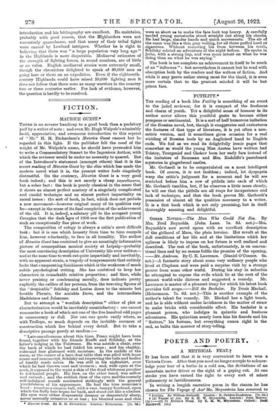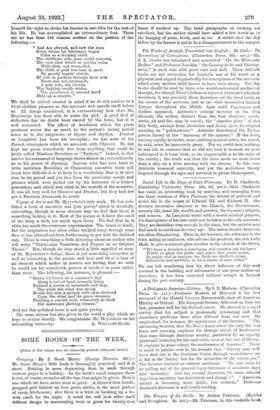POETS AND POETRY.
A METRICAL FEAT4
IT has been said that it is very convenient to have won a Victoria Cross. After that. you need no longer scruple to acknow- ledge your fear of a bathe in a cold sea, the deviations of an uncertain motor driver or the sight of a gaping cut. At one stroke you have earned the right to every sort of minor poltroonery or fastidiousness.
In writing a longish narrative poem in the stanza he has chosen for The Voyage of Ass' Mr. Meyerstein has reserved to
• Puriate. By William Gerhardt. London : R. Cobden-Sanderson. 17s. 6d.] t (1) Voyage of Ass. By E. H. W. Meyerstein. London: John Murray. gasi) (2) in Merlin's Wood. By B, H. W. kfeyersteln. Oxford: Bind4 ckw ell. (5s.) himself the right to clothe his fancies in Vera libre for the rest of his life. He has accomplished an extraordinary feat. There
are no leas than 116 stanzas written on the pattern of the following :—
44 And Ass obeyed, and saw the man
From whom his bitterness began Calm as a sleeping child. The stubborn chin none could mistake, The eyes that would to pardon wake Were shut, not reconciled.
The cloth of gold was torn in parts By greedy topers' clutch,
Of coin in pockets through their arts There was not overmuch. A pale wife, the alewife
Was lighting candle-wicks,
The priesthood in creased hood Held up a crucifix."
We shall be indeed crusted in mind if we do not confess to a vivid childish pleasure as this intricate web unrolls itself before us. All things considered, it is extraordinary how clear Mr. Meyerstein has been able to make his plot. A good deal of deflection has no doubt been caused by the form, but it is well concealed. The effect of wordiness which the poem produces seems due as much to the author's strong period sense as to the exigencies of rhyme and rhythm. Dunbar or Langland has been his exemplar ; he has none of the French atmosphere which we associate with Chaucer. He has kept his poem remarkably free from anything that could be justly called Wardour Streetism or " Tushery." Indeed, in this matter his command of language shows almost as extraordinarily as in his power of rhyming. Anyone who has ever tried to write imitation Moralities or Chaucerim narrative verse will know how difficult it is to keep to a vocabulary that is at once true to its period and yet free from the particular words and phrases which were picked out by the imitators of a former generation, and which now stink in the nostrils of the sensitive. It was all very well for Chaucer and Dunbar, but they had not got a Harrison Ainsworth to avoid.
Voyage of Ass is not Mr. Meyerstein's only work. He has pub- lished a book of narrative and lyric poetry2 which is decidedly interesting, though in some obscure way we feel that there is something lacking in it. Most of the poems in it have the smell of the lamp a little too much upon them. We feel that he is often too much the conscious experimenter. The vessel is ready,
but the inspiration has often either trickled away through some flaw or has after all not been forthcoming to put into the finished cup. There is something a little deterring about an author who will write "Thirty-nine Variations and Fugues on an Original Theme." But, though we may stand a little appalled at some of Mr. Meyerstein's doings, there is yet something attractive as well as interesting in the poems, and here and there a hint of an element which makes us reserve our feeling that we wish he would use his remarkable powers of intellect in prose rather than verse. The following, for instance, is pleasant :— " Queen Cytherea on a summer's day Along a tufted bank serenely lying,
Twisted a crown of amaranth and bay, The while the wind was dying. Beside her sate a nymph with eyes declined
Upon the river and its green recesses, Plucking a curved reed, wherewith to bind Her mistress's glowing tresses."
And yet this polished verse is not quite poetry.
The same author has also given to the world a play which we hope to review shortly. We congratulate Mr. Meyerstein on his



































 Previous page
Previous page